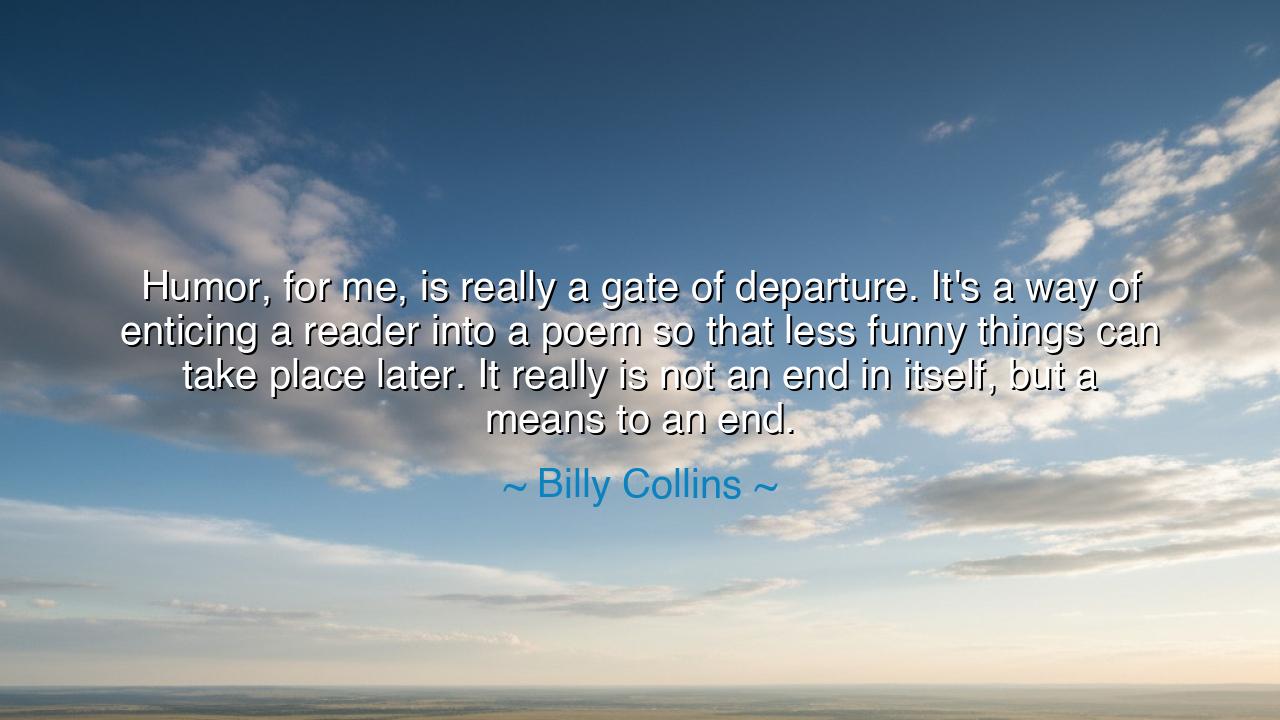
Humor, for me, is really a gate of departure. It's a way of
Humor, for me, is really a gate of departure. It's a way of enticing a reader into a poem so that less funny things can take place later. It really is not an end in itself, but a means to an end.






The words of Billy Collins, “Humor, for me, is really a gate of departure. It's a way of enticing a reader into a poem so that less funny things can take place later. It really is not an end in itself, but a means to an end,” are a meditation on the art of communication, the delicate craft of leading the heart toward truth through the doorway of laughter. In these words, the poet reveals that humor is not a mere diversion, but a sacred tool — a threshold through which the reader steps willingly, only to find beyond it the weight of beauty, sorrow, and revelation. To make another laugh, and then to make them feel, is one of the oldest and noblest acts of the storyteller.
In the ancient world, the great poets and philosophers understood this dance between the light and the profound. The Greek playwright Aristophanes, whose comedies mocked gods and men alike, used laughter to expose folly and speak truth to power. His plays, though wrapped in wit, carried the thunder of philosophy. Beneath the laughter lay lamentation for the corruption of cities and the blindness of leaders. So too does Billy Collins inherit this lineage of the wise fool — the one who begins in jest but ends in revelation. For the mind opens easily to laughter, but it is in that openness that truth can enter unguarded.
Humor, in this way, becomes the poet’s gentle deception — a smile that hides a mirror. It disarms the intellect, lowers the walls of pride, and invites the soul to listen. When Collins calls it a “gate of departure,” he means that laughter carries us from the familiar into the realm of contemplation. It allows the poet to speak of mortality, of loss, of the small and painful truths of being human, without driving the listener away. The wise have always known this path: that to teach through solemnity alone is to speak only to the head, but to teach through laughter is to speak to the heart.
Consider the tale of Nasreddin Hodja, the Sufi sage known for his absurd stories and impossible logic. When a crowd once asked him why he told so many jokes instead of giving them serious teachings, he replied, “Because you are asleep. And no one wakes a sleeper by shouting.” His humor was his gateway — a way to awaken consciousness without violence, to plant wisdom in the soil of delight. Collins, in his own way, follows the same sacred method: the poem begins with laughter, but by its end, the reader is awake, standing quietly in the temple of truth.
It is this balance — of lightness and gravity — that defines the greatest art. A poem that begins in laughter and ends in silence mirrors life itself, which so often begins in innocence and ends in reflection. To laugh, then to ache; to smile, then to see — this is the rhythm of the human heart. In humor, we find both escape and arrival. It is the bridge between the two worlds of experience: the external, where joy dances freely, and the internal, where meaning takes root.
Yet Collins warns us not to mistake the laugh for the lesson. The laughter is the means, not the end. It is the golden thread that draws the reader toward something larger — empathy, awareness, understanding. Like the musician who begins with a playful melody only to unfold into a haunting symphony, the poet uses humor to prepare the soul for depth. For humor without purpose is noise, but humor in the service of wisdom becomes grace.
Let this then be the teaching: use humor as the bridge, not the destination. In life, as in poetry, do not shy away from laughter — for it is the universal language of openness — but let it lead you toward something more enduring. When you speak, when you write, when you comfort or create, let your humor carry compassion beneath it. Invite others to laugh, but let that laughter become a path toward understanding.
For in the end, as Billy Collins teaches, the poet’s task — and indeed, the task of every soul — is not merely to amuse, but to awaken. Humor is the candle that flickers before the dawn; it draws the weary toward warmth, so that they may have the courage to face the rising light. And when they step through that gate of laughter into the realm of truth, they find not jest, but revelation — that even in the smallest smile, there is room for the whole of the human heart.






AAdministratorAdministrator
Welcome, honored guests. Please leave a comment, we will respond soon